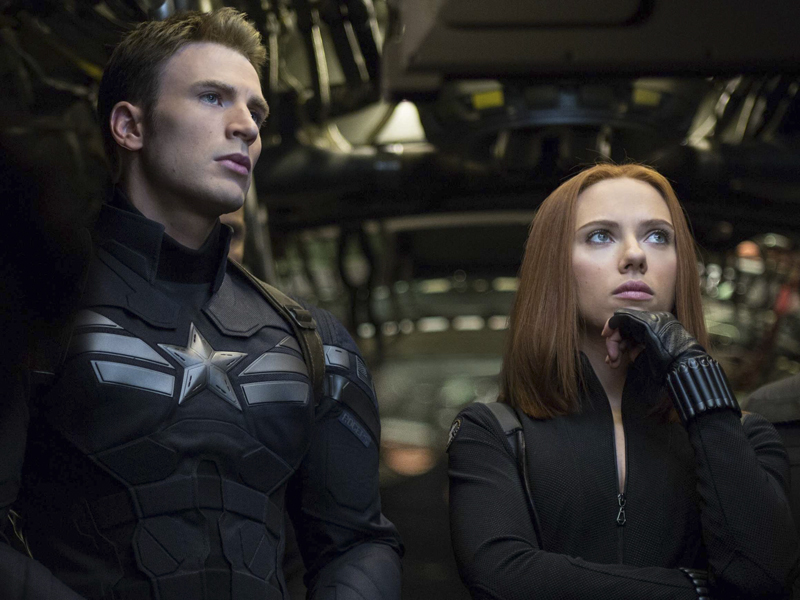
One of the first things that came to my mind after watching “Captain America: The Winter Soldier” (besides “Whoa, what an awesome movie!”) was “Don’t retire, Chris Evans!” This movie packs a punch in more ways than one, as this is the best post-Avengers film that Marvel has created.
Out of all Marvel’s “Phase 2” titles, this movie does the best at portraying character depth. In “Thor: the Dark World,” Thor’s characterization was limited by his narrow-minded thinking (“Hey guys, I know the whole ‘disobeying my father’ schtick didn’t work out too well last time … but let’s try it again!”). In “Iron Man 3,” the deepest aspect of Tony Stark’s characterization was how a panic attack is as equally dangerous as a fire-breathing superhuman who could rip the metal off his suits. Thankfully, “Captain America” does the post-Avengers movies a tremendous service by breathing some life into the title character.
A part of that has to do with Chris Evans simply playing Captain America well for the third time in a row, but it also has to do with the film’s setting, which is much more mature than both the first “Captain America” and “The Avengers.” Instead of fighting cartoonish Nazis or unexplained interdimensional aliens, Steve Rogers finds himself sitting in politically hot water when the blame for an attempt on Nick Fury’s (Samuel L. Jackson) life is thrown upon him by S.H.I.E.L.D. official Alexander Pierce (Robert Redford). Pierce uses the fearful atmosphere in the intelligence agency to try and hunt Rogers down before deploying three more Helicarriers in a bid for what he considers “peace through order,” which entails world domination.
Again, the movie’s setting really bolsters both Rogers’ characterization as well as the themes that the movie attempts to convey. Steve Rogers realizes that his greatest enemies aren’t superpowered or extra-dimensional in any way, but rather they’re regular people who wield great political authority and a blank check. These people believe that the world’s peace and security can and should be achieved by any means necessary, which includes stripping citizens of their freedoms and ordering mass murder. As the idealist who sees the Greatest Generation through rose-tinted glasses, Steve Rogers vehemently opposes this worldview — and because his mind is stuck in the past, this comes off as personal to him. The antagonists are fighting to “protect” humanity’s future; Captain America is fighting to preserve its past — which is both figuratively and literally closer to him than anything else in the 21st century.
There are a few callbacks to the previous film that add some strength to this movie’s formula. There’s a very short but very sweet encounter between Rogers and an Alzheimer’s-ridden, retirement home-living Peggy Carter — his love interest in the previous film — that’s sure to make many of the faint of heart in the audience tear up (I almost did). Toby Jones takes on the role of Nazi scientist Arnim Zola again, where his consciousness has been transported from his physical body to a supercomputer that has the combined personality of HAL 9000 and Dr. Strangelove, but don’t think much of it; his five minutes in the film are purely for exposition (for example, it’s in this scene that the Captain learns about Operation Paperclip, where the U.S. recruited Nazi scientists after the war ended).
Meanwhile, the movie keeps hinting at a potential relationship between Steve Rogers and Scarlett Johansson’s Black Widow. The way they exchange dialogue together, where Black Widow constantly pesters Steve about asking out people they both know, nearly hints at her possible feelings for him, but besides a few snappy lines, nothing plot-worthy is added here. The addition of Sam Wilson (Anthony Mackie) as Falcon, however, is a great plus for the movie. He’s the first superhero out of all the recent Marvel films who can actually connect with Rogers on a personal level, since he also lost men at a time of war. His role felt underwritten and underused; if done properly, this guy could have his own movie.
The action is superb, and it’s another reason why this movie was far better than both the first “Captain America” and “The Avengers.” In those films, Rogers felt more like a super gymnast, spending most of his time going through, over or around obstacles. Here, he uses his abilities, and especially his shield, in a more offensive manner. There are just too many examples of him kicking ass (in contrast with his one important job of pulling a red lever to help fight Loki’s men on the Helicarrier in “The Avengers”). He actually seems like a real superhero this time, as opposed to simply jumping around as a parkour expert.
In a role that clearly shows that he’s not ready for retirement, Chris Evans once again dominates the big screen as Captain America. Out of the three post-Avengers movies, and maybe even out of all the Avengers-arc flicks, “Captain America: The Winter Soldier” is definitely near the top.
4.5/5








